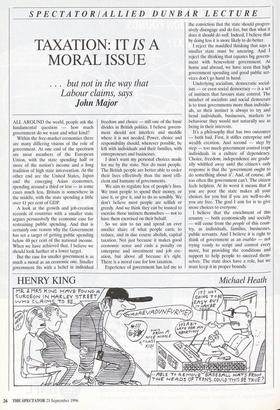SPECTATOR/ALLIED DUNBAR LECTURE
TAXATION: IT IS A
MORAL ISSUE
. . . but not in the way that Labour claims, says John Major
ALL AROUND the world, people ask the fundamental question — how much government do we want and what kind?
Within the free-market economies there are many differing visions of the role of government. At one end of the spectrum are most members of the European Union, with the state spending half or more of the nation's income and a long tradition of high state intervention. At the other end are the United States, Japan and the emerging Asian economies, spending around a third or less — in some cases much less. Britain is somewhere in the middle, with the state spending a little over 41 per cent of GDP.
A look at the growth and job-creation records of countries with a smaller state argues persuasively the economic case for restraining public spending. And that is certainly one reason why the Government has set a target of getting public spending below 40 per cent of the national income. When we have achieved that, I believe we should look further at a lower target.
But the case for smaller government is as much a moral as an economic one. Smaller government fits with a belief in individual freedom and choice — still one of the basic divides in British politics. I believe govern- ment should not interfere and meddle where it is not needed. Power, choice and responsibility should, wherever possible, be left with individuals and their families, with entrepreneurs and businesses.
I don't want my personal choices made for me by the state. Nor do most people. The British people are better able to order their lives effectively than the most effi- cient and humane of governments.
We aim to regulate less of people's lives. We trust people to spend their money, or save it, or give it, and to do so sensibly. We don't believe most people are selfish or greedy. And we think they can be trusted to exercise those instincts themselves — not to have them exercised on their behalf.
So we aim to tax and spend an ever smaller share of what people earn; to reduce, and in due course abolish, capital taxation. Not just because it makes good economic sense and ends a penalty on enterprise and investment and job cre- ation, but above all because it's right. There is a moral case for low taxation.
Experience of government has led me to the conviction that the state should progres- sively disengage and do less, but that what it does it should do well. Indeed, I believe that by doing less it is more likely to do better.
I reject the muddled thinking that says a smaller state must be uncaring. And I reject the thinking that equates big govern- ment with benevolent government. At home and abroad, we have seen that high government spending and good public ser- vices don't go hand in hand.
Underlying socialism, democratic social- ism — or even social democracy — is a set of instincts that favours state control. The mindset of socialists and social democrats is to trust governments more than individu- als, so their instinct is always to try and bend individuals, businesses, markets to behaviour they would not naturally see as being in their interests.
It's a philosophy that has two outcomes — both bad. First, it stifles enterprise and wealth creation. And second — step by step — too much government control traps individuals in a culture of dependency. Choice, freedom, independence are gradu- ally whittled away until the citizen's only response is that the 'government ought to do something about it'. And, of course, all too often the government can't. The citizen feels helpless. At its worst it means that if you are poor the state makes all your choices for you but if you are well-to-do, you are free. The goal I aim for is to give more choices to everyone.
I believe that the enrichment of this country — both economically and socially — will come from the people of this coun- try, as individuals, families, businesses, public servants. And I believe it is right to think of government as an enabler — not trying vainly to script and control every move, but providing the conditions and support to help people to succeed them- selves. The state does have a role, but we must keep it in proper bounds. Not so long ago it was thought that public services like telephones, gas, water and elec- tricity had to be publicly owned and had to be monopolies. The great political advance has been to recognise that public interest does not always require state ownership. Now we have shown that private ownership, competition and regulation can protect the public interest better than public ownership. But private ownership is not the best answer for all areas of the public sector. No Conservative would argue that the state should not have the responsibility to provide a secure defence or an effective police force. Equally, it is right that we should provide universal access to a tax- payer-funded health service, and provide every child with the choice of a state-fund- ed education. And other areas are self-evi- dent, such as the welfare safety-net.
But where privatisation is not an option the government has a double responsibility to ensure efficiency and good service.
I am convinced that the way continually to ratchet up the quality of service is to put power in the hands of the consumer — tell him the standards he has a right to expect from public services, give the information about how they are doing, and offer decent redress if they fall short.
This is what I foreshadowed when I launched the Citizen's Charter five years ago. At the time, some thought the stan- dards too demanding, others believed we would never deliver. But look at the facts. Only a few years ago the holidaymaker used to have to wait three months for a passport. Now it takes less than three weeks. Not long ago, some 170,000 patients had to wait more than a year for hospital treatment. Last year, that was fewer than 5,000. Many patients used to be given the same hospital appointment and were all expected to wait without com- plaint. Patients now get a timed, individual appointment in hospitals and should never have to wait more than 30 minutes. And in education, league tables and testing are transforming standards.
My beliefs lead to a future with decent public services, delivered with a smaller state and lower taxes; a future where the investor, the entrepreneur and the employer are rewarded not penalised; where individuals and families have more indepen- dence to own and save; with an education system that gives every parent choice and every child the opportunities he or she deserves; where private ownership and com- petition is harnessed wherever it can con- tribute to delivering better public services and infrastructure, and where all our public services are accountable to the public they serve, not dragged down by indifference or hijacked by unions.
This is a distinctive Conservative agenda with a common theme: choice and free- dom, for everyone.
From the 1996 annual Spectator/Allied Dunbar lecture delivered by Mr Major on 18 September.



















































































 Previous page
Previous page